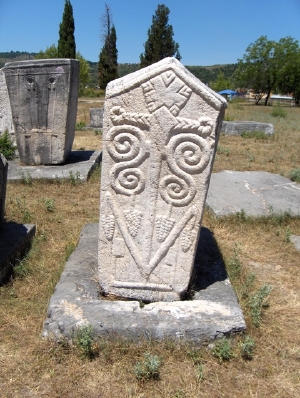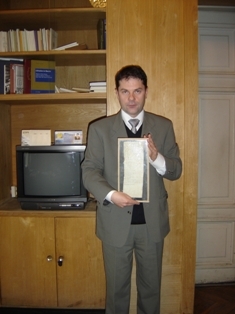
idejaprogramservisengliš |
 |
Kulin Ban's Charter – Povelja Kulina bana
Regie: Zehrudin Isaković; 60 Min., BiH 2006 (OmE)
Wettbewerb: Sondervorstellung
babylon berlin:mitte, Sa, 18.11.2006 um 16:00 Uhr

Weltpremiere, in Anwesenheit des Regisseurs und weiterer Gäste. Im Anschluss lädt die Botschaft von Bosnien-Herzegowina zu einem kleinen Empfang.
The Kulin Ban’s Charter is, according to a number of historians, the oldest document which (in an indirect way though) “validates” the Bosnian statehood and places it in the early 12th century. The Charter was produced on the 29th of August in 1189.
This is also the oldest document in which the Slavonic name “Dubrovnik“ is mentioned. Namely, it had been referred to by its Latin name “Raguza“ in all other documents produced before the Kulin Ban's Charter.
And finally, the Charter is the oldest document of the overall Slavonic litaracy. Therefore its importance runs far beyond the borders of Bosnia and Herzegovina.
There are some misunderstandings concerning the language in which the Charter was written. However, the prevailing conclusion on this issue is that the language used is an Old Slavonic one with the Bosnian characteristics.
Leaving this question aside, we can safely claim that, beyond much doubt, the Kulin’s Charter is the oldest known state document of our country.
The Charter was addressed to Krvaš, Duke of Dubrovnik. If one tries to decribe it using the contemporary vocabulary, it actually represents “a unilateral free-trade permit“ for the tradesmen from Dubrovnik in Bosnia at that time.
In the body text of his document – letter, Kulin Ban says the following:
«....I, Kulin, the Ban of Bosnia, address you Duke Krvaš and all citizens of Dubrovnik and undertake to be your true friend from now and forever.
And I will exercise solid peace, honesty and true trust to you as long as I live.
All people from Dubrovnik who walk and trade where I rule, may go freely wherever they wish to go and trade in my land with true confidence and true heart, with no menace,
while they have no obligation to me but any of them may though give me a present by his own will.
My officials will not exercise any force to them and while they stay here I will support them in a way in which I support myself, as much as possible, and with no evil thought. So help me God and the whole Holy Gospel .»
The historians mostly agree that three Charters were written: one original and two transcripts. There is no official evidence about the existence of the second original which would remain with the Bosnian side.
Nowadays the Archive of Dubrovnik keeps the two transcripts while the Dubrovnik’s original is, according to the Russian sources, in Saint Petersburg at Russian Academy of Science’s Library.
According to the Dubrovnik sources, which have not been seriously questioned, in the mid-19th century Jeremija Grgić, a Serb from Gruž and a Russian Consul, purchased the Charter at the Dubrovnik market from a tradesman who, as legend has it, was not at all aware of its importance. Soon after this (in 1841) the document would be transferred to Saint Petersburg, the capital of Russia at that time. And it is still kept there.
A few books that refer to the Charter were written in Russia. Those books are also held by the Russian Academy of Science's Library. The Russian bibliographers keep the Charter framed and protected by glass covers at Slavonic Department of the Saint Petersburgh Library.
Given the importance of the document, the diplomatic network of Bosnia and Herzegovina recently initiated the issue of eventual handover of the Charter to our country.
The Russian side reacted to this proposal in a restrained way but it has not rejected the Bosnian kind requests altogether either. A possible compensation by some equivalent Russian documents in the possession of the museums or libraries in Bosnia and Herzegovina has been mentioned as a way forward.
With this context in mind, the documentary about the Kulin Ban’s Charter tried to research as much detail as possible about the Charter itself and find answers to the following questions:
1. What were the historic and political contexts like when the Charter was written?
2. Is there a Bosnian original of the Charter and where is it?
3. In which way the original Charter was moved to Saint Petersburgh and to which extent the existing “legend” about it is true?
4. The language of the Charter?
5. What does it actually mean for Bosnia and Herzegovina from both historically and politically?
6. Which documents about the Charter are available today?
7. The future of the original from Russia: is it going to be handed over to Bosnia and Herzegovina?
8. What did the Charter mean for Dubrovnik at the time when it was written and what does it mean for Dubrovnik now?
9. What does the Charter mean in relation to the overall Slavonic Studies?
The recording took place between the 15th of April and the 1st of September 2006.
Interviews with:
Dr. Pavo Živković
Dr. Salih Jalimam
Dr. Enver Imamović
Dr. Enver Halilović
Dr. Milko Brković
Dr. Rea Boshi Gogolja
Doc. Mr. sc. Dragan Dokić
Inž. Zoran Perović
Dr. Tvrtko Kulenović
Dr. Aiša Softić
Prof. mr. Amra Hadžagić
Dr. Simo Ćirković
Dr. Dževad Jahić
Akademik Abdulah Sidran
Dr. Limov (Director of Saint Petersburgh Library)
Animation:
Berin Tuzlić, Via Media
Music:
Sejo Bajraktarević
Executive production:
Studio Fito
Author (script writer and director)
Zehrudin Isaković
Zehrudin Isaković
- Born 8.4.1966. in Zenica, BiH
- Primary and secondary school finished in Zenica
- University of Political Sience, section Journalism finished in Sarajevo year 1995.
- In different status work in listed media:
NTV Hayat in starting this tv station (Sarajevo),
Vreme (Beograd);
Valter (Sarajevo),
Bosanski pogledi (Sarajevo),
War Report (London);
Mladina (Ljubljana);
Ljiljan (Sarajevo);
Dnevni avaz (Sarajevo)
Cooperation in magazines AS, Oslobođenje, Danas
- Work as an advisor for public realtion for president of Federation of BiH, Ejup Ganić year 1997. – 1998.
- Autor of TV serial «Avature of Akongava 2003.» (FTV, 3 shows lasted 30 minutes)
-Autor of TV itinerary «Dnevnik iz Marika» (Diary from Maroco) (FTV, 55 minutes)
- Autor of TV itinerity of ten half an hour long shows about mountains in Mediterran (FTV, 10/ 25 – 30 min)
- Autor of biografy of Alija Izetbegović, which is one part od edition «Colected work of Alija Izetbegović», published by «Oko», Sarajevo
- Was a lider of Project for Council of Europe and Pact for Stability called Link Diversity for BiH (in Project was eight countries from south-east Europe)
- In 2003. establish an NGO Club of Earth's friends called «Planet», the program of this foundation is about ecologie, culture of living in city, promotion of nature and culture in BiH, organization of expedition on mountains, saving the mountains.
- From match 2002. wark as Director of Federal News Agency (FENA)
- Autor of documetary «Povelja Kulina bana» (Charter of Kulin Ban), 2006.
